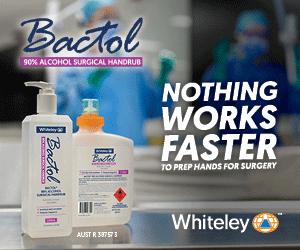Before Ruth Te Rangi arrived at the Christchurch Day of Action on Saturday, she’d had three requests to fill a shift at the dementia unit in the aged-care home where she works.
“I said, no, I’ve got somewhere else to be. They say, oh, but we don’t have enough staff. I said, too bad, I need a break, this is my break away.”
Te Rangi, Canterbury Te Poari representative and long time Tōpūtanga Tapuhi Kaitiaki o Aotearoa NZNO member, was determined to join fellow members and supporters for the unprecedented action.
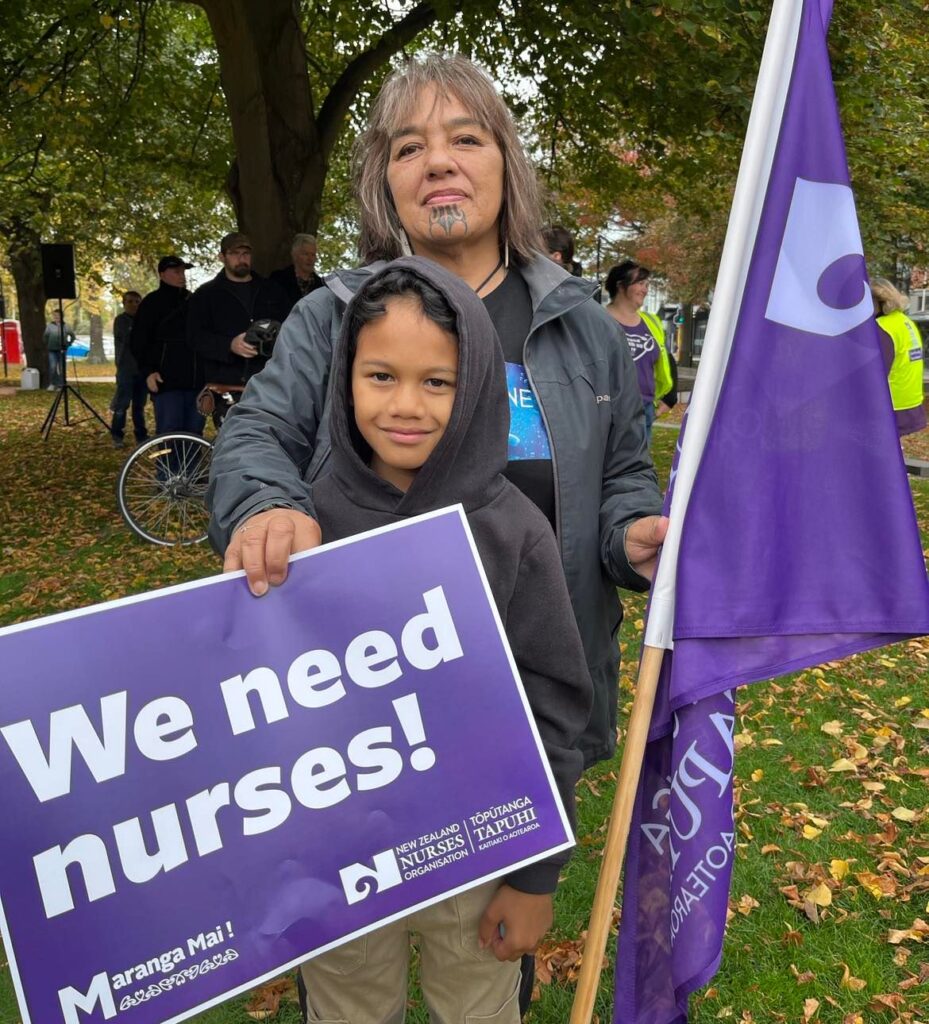
Across the country, NZNO members and supporters came out in force, challenging all political parties to fix the health-care crisis, and put this at the top of their election promises.
Te Rangi started her speech with a karakia tawhito, acknowledging the Bridge of Rembrance – a memorial for all tupuna who served in two world wars, and the starting place for the Christchurch rally.
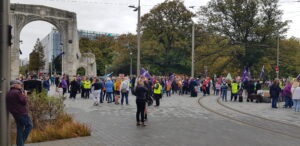
“In my eyes the Bridge of Remembrance reminds us of who we are and where we have come from. Our tupuna are there.They went to war for us, so we could have the freedom to have a better world, a better health system – and what do we have? A system that’s in crisis and a system that is not going to be there for our mokopuna.”
Te Rangi, who attended the event with her mokopuna TeRangiHiroa,7, said she tried to reduce her hours to 32 hours a week, but had not been able to do this in practice as she often stayed later than her rostered hours.
“You just don’t leave, because it’s just not safe for the residents.”
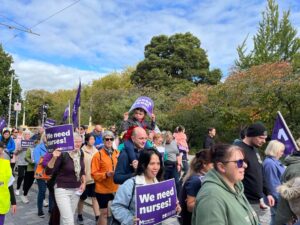
The staffing crisis across all sectors of nursing was the number one motivation for those attending the marches and rallies.
In Wellington, a crowd of about 300 nurses, health-care assistants and supporters marched through the central city, drawing the interest and support of passers by.
“Who are they, Daddy?” one youngster asked as the nurses swung past chanting ‘safer staffing’! “They’re nurses – they look after people,” the dad replied.
Wellington Hospital nurse Georgina (who did not want to give her last name) is only four months into her nursing career and said most wards were “poorly staffed every day”. She wanted to join the rally to “be part of the crowd” speaking up.
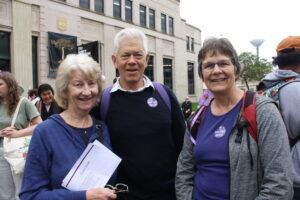
Casual Hutt Hospital nurse Monica Murphy said constant roster gaps meant she was often called in. “There are never enough of us.”
Aged-care HCA Atele Pepa told the crowd it was “hard going” in aged care. “We are always short of nurses and HCAs.”
Many had “unfortunately left to find better pay and conditions elsewhere”, meaning aged-care homes were closing beds off, or shutting down altogether. “That means our sick, elderly mothers and fathers are spending more time in hospital, taking up a bed.”
More Māori and Pasifika nurses were needed, and free training would be a good incentive for them, she said.
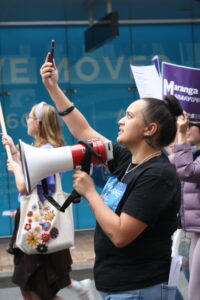
Wellington Hospital nurse, NZNO delegate Helen Kemp, who spoke on the steps of parliament, said it was “outrageous” that nurses had to march for the right to go to work safely and be paid fairly. It was also outrageous that primary health nurses “are not accorded the same pay as hospital nurses”.
At the day’s “peaceful but passionate” rally, she said politicians needed to “seek solutions to the trainwreck we deal with on a daily basis”.
Patients wait for hours and “endure unnecessary prolonged suffering” because of unsafe staffing, Kemp said.
NZNO president Anne Daniels said nurses were “rising up”.
“We are asking for fairness, equity and good working conditions that will allow us to provide safe care to our patients – it’s not hard.”
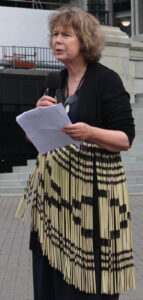
“Our nation can no longer wait – we need action now!”
Christchurch Hospital outpatient HCA Katrina Barrett said there had been no improvement in short-staffing under Te Whatu Ora and she was sick of seeing patients suffering.
“They’re getting their surgeries cancelled left, right and centre. It’s hard for our colleagues who have to ring up and say sorry, it’s been cancelled.”
It was incredible to her that the Government did not see it as a crisis.
In Auckland, Kaiwhakahaere Kerri Nuku said governments had failed to invest in health care and listen to those “at the bedside”.
“What we’ve got is successive governments that have been piecemeal in their approach to investing in healthcare and . . . we need to turn that around.”
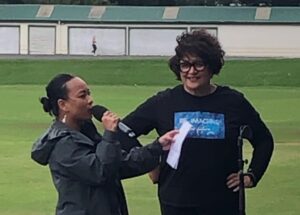
RN Deirdre Guy, from Christchurch Hospital ear, nose and throat outpatient unit, said staffing shortages were evident across all health professions.
“GPs can’t pick up sick patients the same [as they could in the past], so they end up coming back to us and say, ‘I can’t see my GP for a week I saw you five years ago, I don’t have $50 to see my GP to get referred back to you’.”
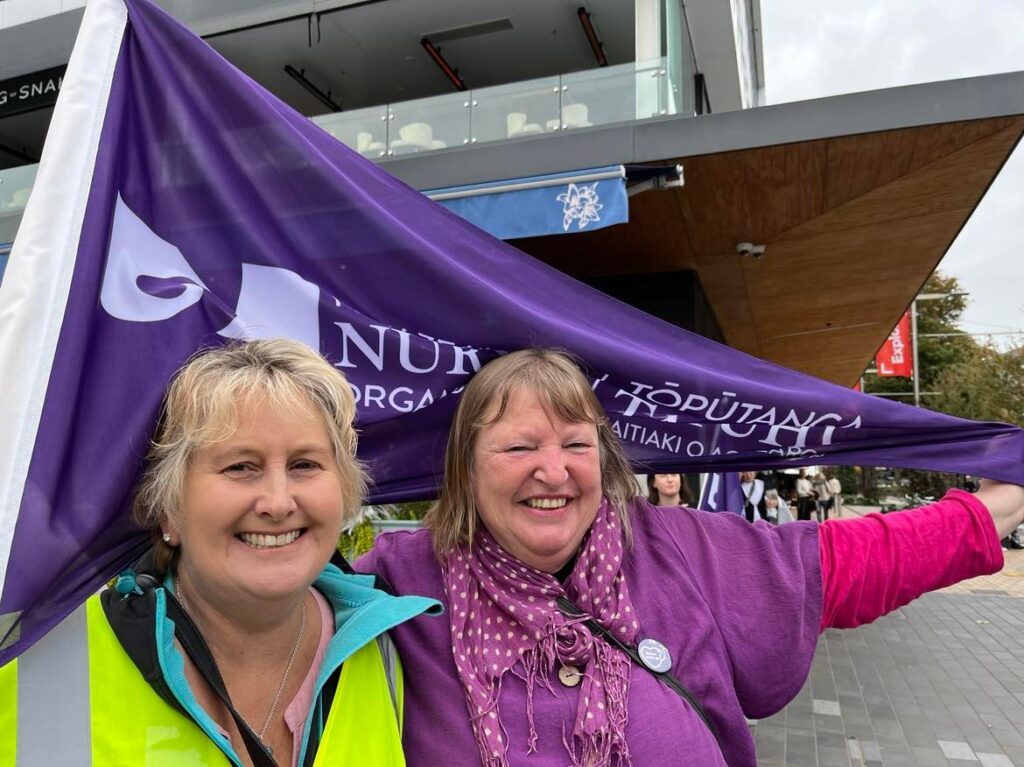
Nurse Maude RN Ruth Abad was at the rally with her husband, also a nurse, and her two young children.
The family moved to New Zealand from the Philippines and wanted to stay, but they were struggling with the pressure created by extreme short-staffing.
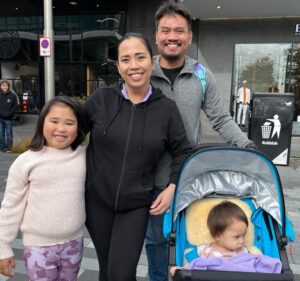
“Most of my friends who moved here from the Philippines have left to go to Australia because there’s more pay.
“I’ve built a family here, and I love it here. It is a struggle because we have to support family back home but we chose to stay, we love Christchurch, we love New Zealand, but we feel we should be paid the same as our other colleagues.”
NZNO chief executive Paul Goulter, who spoke at the Christchurch rally, said the turnout showed nurses were now committed to taking action on the “biggest social issue of our age – the underfunding of our health system”.
“No longer can we have a health system that is built on the goodwill of our health-care workers . . . we cannot built a just health system, and a just society, when it milks the goodwill, and experience of the people who work within it. That’s corrupt, and we stand against corruption.”
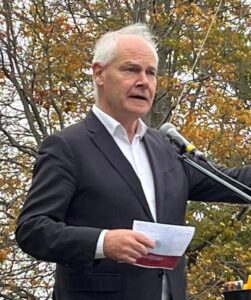
Goulter said the day of action marked the start of a sustained campaign to make sure politicians committed to getting at least 4000 more nurses on the job.
A NZNO petition – ‘We need nurses’ – targeting political parties, to fix the nursing shortage crisis and launched in conjunction with the National Day of Action had recieved over 6000 online signatures by Monday morning. Those collected on Saturday would be added in the next few days.
The petition calls on political parties to commit to:
- 4000 more nurses trained and on the job
- pay that values the nursing workforce right across the health sector and attracts more nurses
- te Tiriti being upheld across our health services to remove inequities




